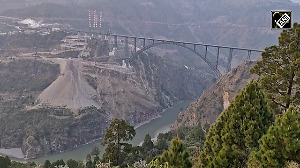Increasing trend of banning controversial films has forced multiplex owners to go in for higher insurance cover.
The latest movies to get the axe are Da Vinci Code and the Aamir Khan-starrer Fanaa, which have compelled some owners of multiplexes to opt for property risk cover in Gujarat.
Property insurance has suddenly topped the list of covers taken by multiplexes, following the Aamir Khan incident. In 1998, Subhash Ghai started the trend by insuring the Aishwarya Rai and Akshaye Khanna-starrer Taal for Rs 110 million, following which film insurance has gained wider acceptance with producers as well as multiplexes.
"Multiplexes are usually insured against fire, flood, accident or any such calamities," said Ashok Purohit of City Pulse. There is a general assumption that multiplexes are involved in insuring a film's print, but that is not true.
Usually, a film print, valued at around Rs 70,000, is insured by the producer in Mumbai itself and both the distributors and the multiplex, which screens the print, have no part to play in the film's insurance, he added.
Recently, multiplexes had to cancel the screening of another Aamir Khan-starrer Rang De Basanti because of the same reason as Fanaa, after violent protesters tried to disrupt the screening of the film in one of the multiplexes in the city.
Estimating the loss incurred on account of this disruption at Rs 200,000, Shishir Barhate, manager-call centre, Fun Republic, said, "In case of unavoidable circumstances, if a show is cancelled, the multiplex's insurance cover enables the customers to get a refund on their tickets."
Although film producers mostly take up six different types of policies including insurance on artistes, properties, public liability, money insurance, workmen insurance and accident insurance, among others, multiplexes acknowledge having only three main insurance covers -- property, refund liability and third party liability.
According to Kaushal Shah, manager of accounts and finance at R-World, property liability policies in recent times have undergone a sea change with the addition of specific clauses for unforeseen events like rioting and disruptive public behaviour. Third party liability is also a policy that all multiplexes have acquired, he said.
Interestingly, insurance amounts of the multiplexes situated in the outskirts of the city are not as high as those of the multiplexes within the limits of the city, as there is a perception among multiplex owners that third party liability or agitation of public is less likely to affect them, he added.
Do you want to discuss stock tips? Do you know a hot one? Join the Stock Market Investments Discussion Group







 © 2025
© 2025